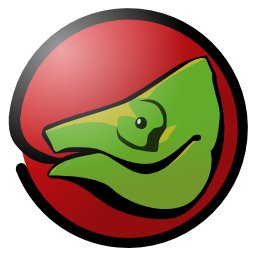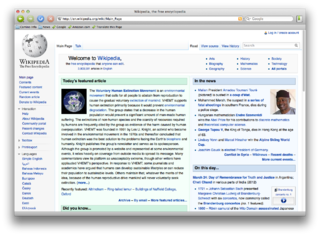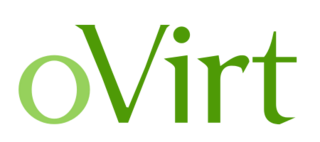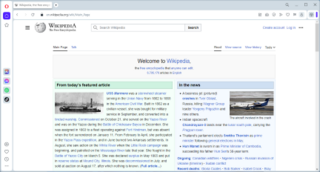
Galeon is a discontinued Gecko-based web browser that was created by Marco Pesenti Gritti with the goal of delivering a consistent browsing experience to GNOME desktop environment. It gained some popularity in the early 2000s due to its speed, flexibility in configuration and features.

Konqueror is a free and open-source web browser and file manager that provides web access and file-viewer functionality for file systems. It forms a core part of the KDE Software Compilation. Developed by volunteers, Konqueror can run on most Unix-like operating systems. The KDE community licenses and distributes Konqueror under GNU GPL-2.0-or-later.

K-Meleon is an open-source, lightweight web browser for Microsoft Windows. K-Meleon can use the secure Goanna layout engine based on Mozilla's Gecko or the Gecko engine itself. K-Meleon was one of the first projects to use Gecko outside of Mozilla's original internet suite. K-Meleon began with the goal of being faster and lighter than the cross-platform suite of applications. It was the first stand-alone Gecko browser for Windows, predating Mozilla Firefox. It still has lower system requirements than most browsers and supports legacy systems.

Camino is a discontinued free, open source, GUI-based Web browser based on Mozilla's Gecko layout engine and specifically designed for the OS X operating system. In place of an XUL-based user interface used by most Mozilla-based applications, Camino used Mac-native Cocoa APIs. On May 30, 2013, the Camino Project announced that the browser is no longer being developed.

Avant Browser is a discontinued freeware web browser from a Chinese programmer named Anderson Che with the browser engines Trident, Gecko and Webkit the user can switch between. It runs on Windows 2000 and above, including Windows 8, Windows 8.1 and Windows 10. Internet Explorer versions 6 through 11 are supported.
URL redirection, also called URL forwarding, is a World Wide Web technique for making a web page available under more than one URL address. When a web browser attempts to open a URL that has been redirected, a page with a different URL is opened. Similarly, domain redirection or domain forwarding is when all pages in a URL domain are redirected to a different domain, as when wikipedia.com and wikipedia.net are automatically redirected to wikipedia.org.
NetCaptor was an Internet Explorer shell that was in development from 1997 to 2005. It used the Trident layout engine of Internet Explorer in conjunction with additional programmed features to create an alternate browsing experience with a tab-based interface and an expanded feature set. It was an adware/shareware program, but its developer released a registration key for free public use once development ceased.

YaCy is a free distributed search engine, built on the principles of peer-to-peer (P2P) networks created by Michael Christen in 2003. The engine is written in Java and distributed on several hundred computers, as of September 2006, so-called YaCy-peers. Each YaCy-peer independently crawls through the Internet, analyzes and indexes found web pages, and stores indexing results in a common database which is shared with other YaCy-peers using principles of peer-to-peer. It is a search engine that everyone can use to build a search portal for their intranet and to help search the public internet clearly.

A web API is an application programming interface for either a web server or a web browser. It is a web development concept, usually limited to a web application's client-side, and thus usually does not include web server or browser implementation details such as SAPIs or APIs unless publicly accessible by a remote web application.

GNU IceCat, formerly known as GNU IceWeasel, is a completely free version of the Mozilla Firefox web browser distributed by the GNU Project. It is compatible with Linux, Windows, Android and macOS.

oVirt is a free, open-source virtualization management platform. It was founded by Red Hat as a community project on which Red Hat Virtualization is based. It allows centralized management of virtual machines, compute, storage and networking resources, from an easy-to-use web-based front-end with platform independent access. KVM on x86-64, PowerPC64 and s390x architecture are the only hypervisors supported, but there is an ongoing effort to support ARM architecture in a future releases.

Opera is a multi-platform web browser developed by its namesake company Opera. The browser is based on Chromium, but distinguishes itself from other Chromium-based browsers through its user interface and other features.

Google Chrome is a cross-platform web browser developed by Google. It was first released in 2008 for Microsoft Windows, built with free software components from Apple WebKit and Mozilla Firefox. Versions were later released for Linux, macOS, iOS, and also for Android, where it is the default browser. The browser is also the main component of ChromeOS, where it serves as the platform for web applications.
A scripting language or script language is a programming language that is used to manipulate, customize, and automate the facilities of an existing system. Scripting languages are usually interpreted at runtime rather than compiled.

The Intelligent Input Bus is an input method (IM) framework for multilingual input in Unix-like operating-systems. The name "Bus" comes from its bus-like architecture.

Chromium is a free and open-source web browser project, mainly developed and maintained by Google. This codebase provides the vast majority of code for the Google Chrome browser, which is proprietary software and has some additional features.

Uzbl is a discontinued free and open-source minimalist web browser designed for simplicity and adherence to the Unix philosophy. Development began in early 2009 and is still considered in alpha software by the developers. The core component of Uzbl is written in C, but other languages are also used, most notably Python. All parts of the Uzbl project are released as free software under GNU GPL-3.0-only.

A progressive web application (PWA), commonly known as a progressive web app, is a type of application software delivered through the web, built using common web technologies including HTML, CSS, JavaScript, and WebAssembly. It is intended to work on any platform with a standards-compliant browser, including desktop and mobile devices.

Searx is a free and open-source metasearch engine, available under the GNU Affero General Public License version 3, with the aim of protecting the privacy of its users. To this end, Searx does not share users' IP addresses or search history with the search engines from which it gathers results. Tracking cookies served by the search engines are blocked, preventing user-profiling-based results modification. By default, Searx queries are submitted via HTTP POST, to prevent users' query keywords from appearing in webserver logs. Searx was inspired by the Seeks project, though it does not implement Seeks' peer-to-peer user-sourced results ranking.














